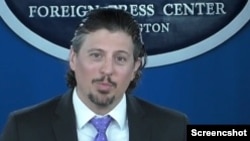From the very beginning, President Joe Biden has made it clear that he considers the fight against corruption, both global and domestic, to be a core national security interest and foreign policy priority for the United States.
That is because corruption destroys trust, undermines development, erodes confidence in democratic institutions, and hinders economic growth. Ultimately, it is the citizens who suffer the consequences as prices rise, fewer resources are invested in the public sector, and the environment is degraded.
That is why the White House released the first ever U.S. Strategy on Countering Corruption, which provides a blueprint for how the United States will respond to corruption and related crimes. To integrate and elevate the fight against corruption across all aspects of U.S. diplomacy and foreign assistance, President Biden appointed Richard Nephew as the U.S. State Department’s Coordinator on Global Anti-Corruption.
Speaking at a press briefing late last month [August 25, 2022], Coordinator Nephew said that the Strategy “is organized in five mutually reinforcing pillars.”
“The first is modernizing, coordinating, and resourcing U.S. Government efforts to prevent corruption. Second is curbing illicit finance. The third, holding corrupt actors accountable. The fourth, preserving and strengthening the multilateral anti-corruption architecture. And fifth, improving diplomatic engagement and leveraging foreign assistance resources to achieve anti-corruption policy goals.”
Cutting across the implementation of the anti-corruption strategy are several priorities that demand special attention.
“First,” Coordinator Nephew said, “we’re working to develop more integrated approaches to our anti-corruption work.”
“Real progress is going to require a bundle of reforms and persistent effort by all parties to achieve results, informed by an understanding of what works in particular contexts and in particular countries.”
“Second, we’re working to galvanize action by the anti-corruption community and bolster implementation of anti-corruption commitments.”
“Third, the United States will continue to play a leadership role in the fight against corruption, and we will do so in partnership with many countries and organizations already dedicated to this cause.”
Finally, the United States “will look to strengthen our own internal regulations and legislation, [to see] what we can do to make sure our own best practices are fully up to snuff,” said Coordinator Nephew.
“There’s no silver bullet to solve corruption,” he said. “We’re all in this together and we all have this challenge that we’re dealing with.”






